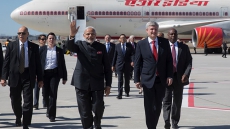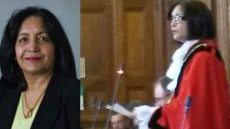WASHINGTON — Calling for a "new college compact," Hillary Rodham Clinton on Monday unveiled a $350 billion plan aimed at making college more affordable and reducing the crushing burden of student debt.
At a town hall meeting in New Hampshire, the state with the highest average student debt in the country, Clinton proposed steps to reduce the cost of four-year public schools, make two-year community colleges tuition-free and cut student loan interest rates, according to campaign aides.
She pitched her plan as a public-private partnership, requiring a contribution from the federal government and states, the colleges and universities and students themselves.
"Americans will have to work hard to put themselves through school to out-learn and out-hustle our competitors, just like we always have," she told voters gathered at a high school in Exeter, New Hampshire.
The college affordability plan, a main plank of her policy platform, is an effort to address a major financial stress for many American families and satisfy a central demand of the Democratic party's liberal wing.
The proposal centres on a $200 billion federal incentive system aimed at encouraging states to expand their investments in higher education and cut student costs. States that guarantee "no-loan" tuition at four-year public schools and free tuition at community colleges will be eligible to receive federal funds.
But Clinton doesn't go quite as far as some of her primary challengers. In May, Vermont Sen. Bernie Sanders released his own plan that would eliminate tuition and fees for public universities. The $70 billion annual proposal would be funded by imposing a tax on transactions by hedge funds, investment houses and other Wall Street firms. Former Maryland Gov. Martin O'Malley has proposed giving all students access to debt-free college at in-state universities within five years.
Although she didn't mention her rivals by name, Clinton said simply asking the federal government to pay for tuition is not an appropriate way to lower the burden on students.
"We can't expect the federal government just to pay the bill for free, that's not how America works," she said.
While military veterans, lower-income students and those who complete a national service program, like AmeriCorps, would go to school for free in the Clinton plan, others would incur costs for their schooling and living expenses at four-year public universities. "For many students, it would translate into debt-free tuition," said Carmel Martin, executive vice-president for policy at the Center for American Progress, who advised Clinton on that plan. "It will depend on the student circumstances and the institution they are going to."
For most students, their families will still be expected to make a "realistic" contribution, say Clinton's aides, and students will contribute wages from ten hours of work per week.
Those currently repaying loans would be able to refinance their outstanding debt at lower rates, a change Clinton's aides say will save an average of $2,000 for 25 million borrowers over the life of the loan — an amount equal to just about $17 per month over a 10-year repayment period. She would also expand income-based repayment programs, allowing every student borrower to enrol in a plan that would cap their payments at 10 per cent of their income with remaining debt forgiven after 20 years.
The cost of Clinton's plan would be offset by capping itemized tax deductions for wealthy families at 28 per cent, like those taken by high-income taxpayers for charitable contributions and mortgage interest. That proposal, which has long been included in President Barack Obama's annual budget, would raise more than $600 billion in the next decade, according to the Treasury Department.
Clinton's plan would likely face a steep climb in Congress: A $60 billion Obama administration initiative for free community college has gotten little traction.
Republican presidential candidates criticized the costs of Clinton's proposal on Monday morning.
"Every time you add more money and financial aid, (traditional colleges) raise their tuition rates," Florida Sen. Marco Rubio said in an interview on Fox News. "That's what's going to happen here again unless they have competition."
Former Florida Gov. Jeb Bush released a statement saying the proposal would "raise the cost of college even further and shift the burden to hardworking taxpayers."
College affordability has emerged as a major issue on the presidential campaign trail, as families face the highest debt burden in generations. National student debt is near $1.3 trillion dollars and the average price for in-state students at public four-year universities is 42 per cent higher than it was a decade ago, according to the College Board.
Clinton aides believe their plan will help build enthusiasm for her candidacy with younger voters — whose support twice helped catapult Obama into the White House. The policy roll-out is timed for when students return to college campuses. Clinton organizers plan to promote the plan at registration events and other gatherings kicking off the school year, according to a campaign aide, in an effort to galvanize college students.
Adam Green, co-founder of the Progressive Change Campaign Committee, which has advocated to elevate college affordability to a top political issue, praised Clinton's "bold proposal."
"It represents a sea change in this conversation in just a year or so," he said.




